What Is a Google Ads Audit?
A Google Ads audit is the process of analyzing the effectiveness of current campaigns. Such audits reveal problems and opportunities that might have gone undetected. Google Ads audits enable you to address issues, improve overall digital advertising health, and apply best practices for optimizing your Google Ad accounts. Audits identify inefficiencies and help you eliminate wasteful ad spend.
Here are some signs that you’re due for an audit:
- Your campaigns are generally going well, but results are inconsistent.
- You are gaining traffic, but not in proportion with your ad spend.
- You have a vague feeling that your ad campaigns should be doing better.
- You haven’t run an audit recently. Or ever.
Google Ads is a complicated platform. Its many tools, formats, reports, and audience targeting options can be hard to fully comprehend. Google Ads also offer a lot of ways to spend your company’s money – real money. That’s why it’s important to know what you’re doing in Google Ads; seemingly small mistakes can lead to expensive and sometimes failed campaigns. And that’s also why we recommend you audit your Google Ads regularly.
Tips on Conducting a Google Ads Audit
Start with The Basics
- Are your conversions tracking correctly?
- Are you linking your Google Ads account to your Google Analytics account?
- Are you using the right bidding option? (Maximize Conversions, Maximize Clicks, Target CPA, etc.)
- What is the status of your current Google Ads Account? (Average monthly spend, active campaigns, active ad groups, active ads, targeted locations, ad schedule, etc.)
To check your conversions, go to the Tools & Settings tab under Measurement, and click Conversions.
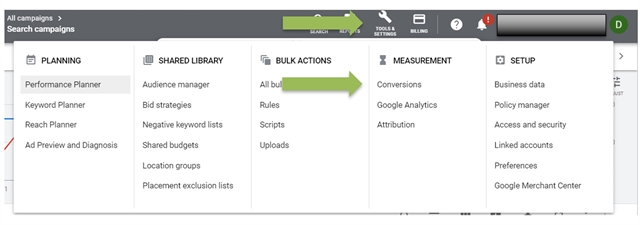
Under the same tab, you can check your linked accounts; under Setup, click Linked Accounts.
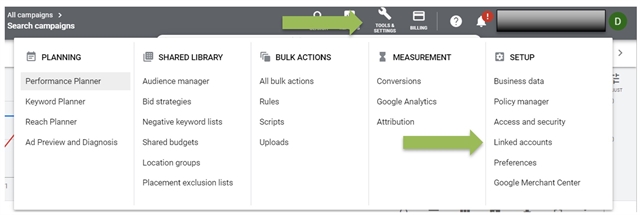
If you don’t remember which type of conversions you chose when you set up your campaigns, go to the Setting tab on the side and click Campaign Settings, to refresh your memory and see your bid strategy type.

To review all your campaigns, go to the Campaigns tab. Review your ad performance, campaign structure, location targeting, audience targeting, etc.
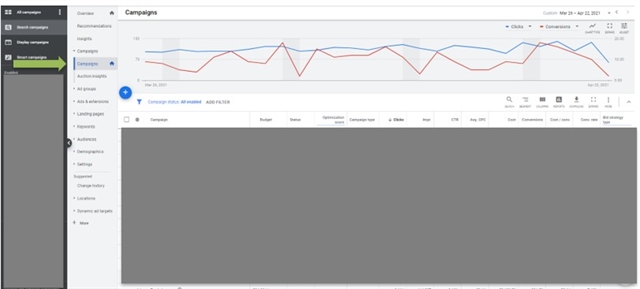
A list of the important Google Ad components to review in your account status could look something like this:
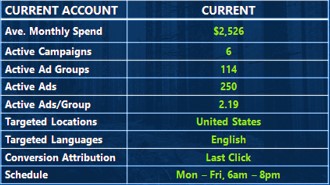
In this audit step, analyze your current campaigns and gather data for further analysis. (This is where you meet your inner data analyst.)
Analyze Your Google Ads Budget
Do you need to spend more or reduce spending? Your budget is based on your advertising goals and shows your spend. An analysis of the results will show the actual effect of your advertising efforts. Then you’ll know whether your ad spend and your results are balanced or lopsided.
To make sure your return on ad spend is profitable, check out our tips on adjusting your Google Ads budget.
Analyze Your Competitors
Once you put together data about your campaigns, start analyzing competitor campaigns. Knowledge about them enables you to compare your campaigns with theirs. Ask yourself:
- Which competitors run ads?
- How much are your competitors spending on ads?
- What keywords attract your competitors’ bids?
- What do your competitors ads look like?
- Do they run Facebook ads?
- Do they run LinkedIn ads?
- Do they run ads for the same class of products/services that your company sells? Which particular products and services?
- What is their organic traffic per month? (It’s important to look at their SEO health while analyzing their PPC, or Pay Per Click, health)
You won’t find this information within Google Ads; instead, you’ll need to rely on third-party tools, such as:
- SpyFu to analyze their top search ads and their top keywords
- Semrush to analyze top keywords, search ads, display ads, etc.
- Ahrefs to analyze their SEO (Search Engine Optimization) performance
- Facebook ad library to see if they run ads on Facebook
- The company's LinkedIn profile, to check for any ads
PPC and SEO work together, so it’s important to look at both. These tools will allow you to see how your competitors advertise and will give you a feel for their overall digital presence.
Analyze Conversion Performance
Look at how your conversions have been performing; make sure that they’re set up in Google Analytics. Conversions analysis reveals what is and isn’t working and guides future decisions. Low conversion rates are red flags - they mean that your ads aren’t capturing searchers’ attention.
Analyze Keywords and Search Term Performance
Don’t guess about keyword performance — always analyze it. Know which keywords drive conversions. Remove keywords that don’t perform. Note that keywords with low impressions negatively impact the overall Quality Score. Remove them. This is the best way to reduce ad spend.
Check search terms that brought users to click on your ad as it appeared in Google search results. These search terms show you what users are seeking when they land on your ad. Do their queries employ a popular word you haven’t bid on? A keyword that, though unbid, is already bringing in conversions? Then it makes sense to start bidding on that key term.
But what if some terms that bring users to your ad don’t seem to make any sense? Users of such terms are probably coming to your ad by accident and thus do not convert. By designating that search term as a negative keyword, Google will prevent your ad from showing up for it so you don’t pay for clicks that will fail to drive conversions.
Check Your Landing Pages
When users click on your ad, where do they land? That landing page should be designed to convert ad-driven visitors into leads. The landing page should make sense to the user as a follow-up to the ad. Make sure your landing pages match the messaging of your ads.
Check Ad Extensions
Ad extensions give you a competitive advantage. If your current ads lack extensions, we recommend you create them.
Extensions add further information below your ad in search results pages. This info makes the advertisement more useful to users. They usually include additional links to your website, reviews, or telephone numbers.
Take, for example, this Macy’s Mother’s Day ad:
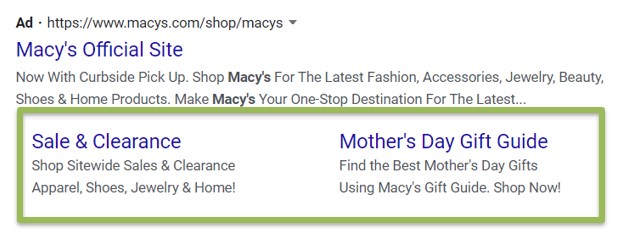
Now You're Ready to Make Changes
After analyzing your current ad structure, ad budget, conversions, keywords, landing pages, and your competitors’, it’s time to make your changes. Restructure your campaigns, build new ad copy, strengthen calls to action, adjust your keywords, and take users to a page that matches the message of your ad.
Searchers appreciate helpful advertising — and so does Google. Don’t let your searchers or your business down. You now know exactly what to do, so start optimizing and drive those conversions!
If you’re looking to improve your Google Ads or need help analyzing your current Google Ad account, our team is here to help! Don’t hesitate to contact us. Also, don’t forget to keep up with the latest digital marketing trends — subscribe to our blog emails.






